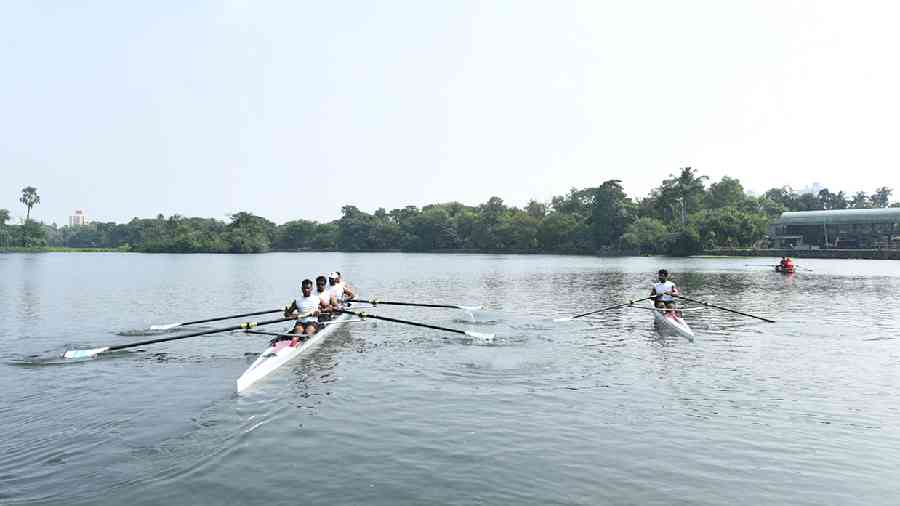Rowing returned to Rabindra Sarobar on Thursday, exactly five months after the drowning of two teenage rowers during a ferocious Nor’wester on May 21.
A team of environmental experts constituted by the Kolkata Metropolitan Development Authority (KMDA), the custodian of the lake, tested water samples and other environmental parameters before and after a petrol-operated rescue boat sailed on the lake.
The test results will be available after 72 hours, said a KMDA official.
The water quality, air quality and noise levels on the Sarobar premises, before and after the trial, will be assessed.
But more than one boat with rowers took to the waters on Thursday itself, after the test was done.
KMDA officials said they did not object because a rescue boat was in place.
Full-fledged rowing — which sees at least a dozen boats during practice sessions — is likely to resume from next week.
“The KMDA will convene a meeting on October 28. Provided the reports are satisfactory, we will give a formal permission to resume rowing at the meeting,” said a KMDA official who was part of the team that visited the Sarobar on Thursday.
Rowing was suspended in the Sarobar, the only rowing venue in West Bengal, following the May 21 accident.
Much of the delay in resumption of the Olympic sport had been attributed to a refusal by the KMDA to allow petrol-powered rescue boats in the Sarobar, citing a bar that it said was imposed by the National Green Tribunal.
Based on trials, the clubs have held that electric boats are not fast enough to respond to a crisis, like the one that proved fatal on May 21.
During a September 5 hearing, the tribunal said it had never restrained the KMDA from allowing petrol-powered rescue boats in the lake.
The NGT’s observations paved the way for the resumption of the sport. Thursday’s trial followed a request by the three rowing clubs by the lake, under the banner of the state rowing association, in the wake of the NGT’s observations. The petrol boat’s trial began around 11.45am on Thursday.
Young rowers had flocked to the Sarobar along with coaches and officials of the clubs.
The team of experts, led by Kalyan Rudra, chairperson of the state pollution control board, collected water samples once before the trial and twice after (just after the trial ended and again an hour later).
Pratik Gupta, 20, who has won medals consistently in different age-categories over the past few years, was among the first to take to the waters after the trial on Thursday.
Frustrated about the lack of practice for five months, Gupta, who represents Lake Club, had decided to shift to Srinagar in Kashmir.
He wanted to practise in Dal Lake and got permission from the authorities there.
“I was told to wait just a bit longer and leave by the end of this month if things did not work out. I am so happy and relieved that things finally worked out,” said Gupta, who rowed a single-scull boat on Thursday.
“We are very happy rowing is back. We expect to start fullfledged rowing within a week to 10 days,” said Subhasish Dasgupta, president of the West Bengal Rowing Association and a member of the Lake Club.
